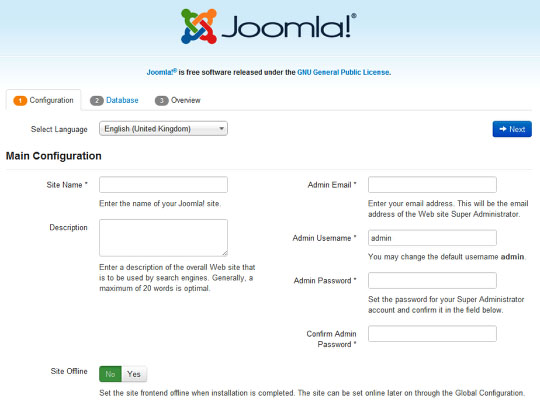
In this tutorial, we will show you how to install Joomla on Ubuntu 14.04. For those of you who didn’t know, Joomla is a free and open-source popular content management that uses PHP and a backend database, such as MySQL. It offers a wide variety of features that make it an incredibly flexible content management system right out of the box. Furthermore, there are hundreds of free extensions written for that allow users to extend its functionality and customize it to their own objectives. A major advantage of using a content management system (CMS) is that it requires almost no technical skill or knowledge to manage.
This article assumes you have at least basic knowledge of Linux, know how to use the shell, and most importantly, you host your site on your own VPS. The installation is quite simple. I will show you the step-by-step installation of Joomla on the Ubuntu 14.04 server.
Prerequisites
- A server running one of the following operating systems: Ubuntu 14.04, and any other Debian-based distribution.
- It’s recommended that you use a fresh OS install to prevent any potential issues.
- SSH access to the server (or just open Terminal if you’re on a desktop).
- A
non-root sudo useror access to theroot user. We recommend acting as anon-root sudo user, however, as you can harm your system if you’re not careful when acting as the root.
Install Joomla on Ubuntu 14.04
Step 1. Install required packages.
sudo apt-get update sudo apt-get install apache2 mysql-server mysql-client php5 libapache2-mod-php5 php5-mysql php5-curl php5-gd php5-intl php-pear php5-imagick php5-imap php5-mcrypt php5-memcache php5-ming php5-ps php5-pspell php5-snmp php5-tidy php5-xmlrpc
Step 2. Install Joomla.
Download the latest version of Joomla.
https://github.com/joomla/joomla-cms/releases/download/3.4.0/Joomla_3.4.0-Stable-Full_Package.zip
Unzip and copy the content to the Apache2 default directory in Ubuntu by running the commands below:
sudo unzip -q Joomla*.zip -d /var/www/html
Change ownership of /var/www/html:
sudo chown -R www-data.www-data /var/www/html sudo chmod -R 755 /var/www/html
Step 3. Configure Apache webserver.
Create a new virtual host configuration file at the location /etc/apache2/sites-available/idroot.us.conf:
#nano /etc/apache2/sites-available/idroot.us.conf <VirtualHost *:80> ServerAdmin sys@idroot.us DocumentRoot /var/www/html ServerName www.idroot.us ErrorLog /var/log/apache2/error.log </VirtualHost>
Step 4. Create MySQL database and user.
# mysql -u root -p mysql> CREATE DATABASE joomla; mysql> GRANT ALL PRIVILEGES on joomla.* to 'joomlauser'@'localhost' identified by 'your_password'; mysql> FLUSH PRIVILEGES;
Step 5. Start Apache and MySQL services.
sudo service apache2 restart sudo service mysql restart
Step 6. Access the Joomla Installer.
Now you can finish your Joomla installation by opening your favorite web browser and navigating to http://your_ip_address.

Once you have finished going through the installer, delete the installation folder per Joomla’s instructions and change the permissions on the config file:
sudo rm -rf /var/www/installation/ sudo chmod 755 /var/www/configuration.php
Congratulations! You have successfully installed Joomla. Thanks for using this tutorial for installing the Joomla content management system on Ubuntu 14.04 systems. For additional help or useful information, we recommend you to check the official Joomla website.